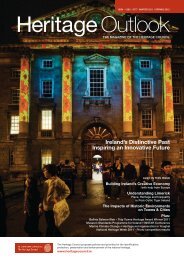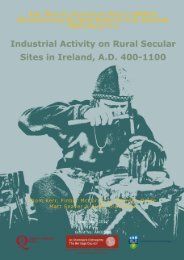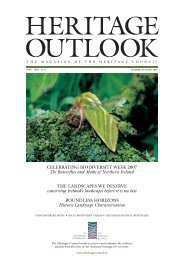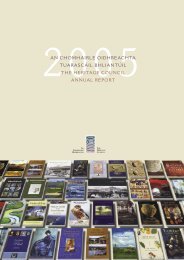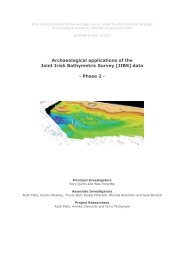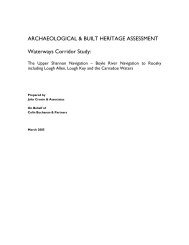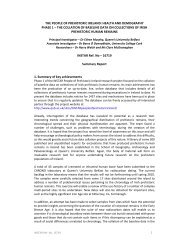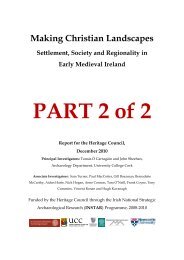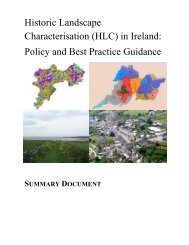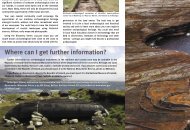The Heritage Council Annual Report 2002
The Heritage Council Annual Report 2002
The Heritage Council Annual Report 2002
You also want an ePaper? Increase the reach of your titles
YUMPU automatically turns print PDFs into web optimized ePapers that Google loves.
6. Best Practice in <strong>Heritage</strong><br />
Conservation and Management<br />
Restoration of Mayglass Farmstead<br />
<strong>The</strong> <strong>Heritage</strong> <strong>Council</strong> has supported and financially assisted the conservation of a<br />
vernacular farmstead, its ancillary buildings and furniture at Mayglass, Co Wexford<br />
since 1998. <strong>The</strong> philosophy for the repair of the buildings has involved different<br />
disciplines and best conservation practice. Some of the techniques used were new to<br />
conservation in Ireland and the lessons learned need to be shared with the wider<br />
community. <strong>The</strong> house is privately owned, though the <strong>Heritage</strong> <strong>Council</strong> has a 10 year<br />
agreement with the owner to undertake conservation and education projects at<br />
Mayglass. <strong>The</strong> main house is very small and its contents are fragile, so large numbers<br />
of people cannot be accommodated for visits.<br />
<strong>The</strong> <strong>Council</strong> wishes to establish a methodology for informing a wider constituency<br />
about the Mayglass project and disseminating the experience gained, while not putting<br />
undue pressure on the fabric of the building and respecting its current use as part of a<br />
working farm.<br />
Current activities include a publication on Mayglass containing a series of technical<br />
essays for the professional and the general public to be published later this year. In<br />
addition there is a project website www.Mayglass.2000.ie.<br />
At present, Mayglass is providing an invaluable educational tool for specialists in<br />
architectural conservation. However, to reach a wider audience, the <strong>Council</strong> is<br />
undertaking an educational/interpretative project at Mayglass, principally aimed at the<br />
non-specialist, interested general public, primary and secondary schools, and which<br />
includes all aspects of the heritage.<br />
<strong>The</strong> <strong>Council</strong> wishes to examine how best to explore a number of themes, and to<br />
investigate the best ways to communicate:<br />
• On the buildings of Mayglass and its conservation<br />
• How life was lived in Mayglass –what the artifacts and furniture etc were used for?<br />
• Exploring the past through these objects<br />
• <strong>The</strong> relevance of these objects to the present, and to sustainable living<br />
• How Mayglass can be used to explore other aspects of our heritage (e.g. ecology,<br />
folklore, archaeology)<br />
<strong>Council</strong> is at present carrying out research on the range of educational opportunities<br />
offered by the Mayglass Project; identifying target groups and the potential demand<br />
and fitting the educational opportunities offered by Mayglass to the needs of these<br />
groups. Importantly they are examining how best to use the opportunities within the<br />
constraints of accessing the site – e.g., web-based; distance learning; virtual reality.



